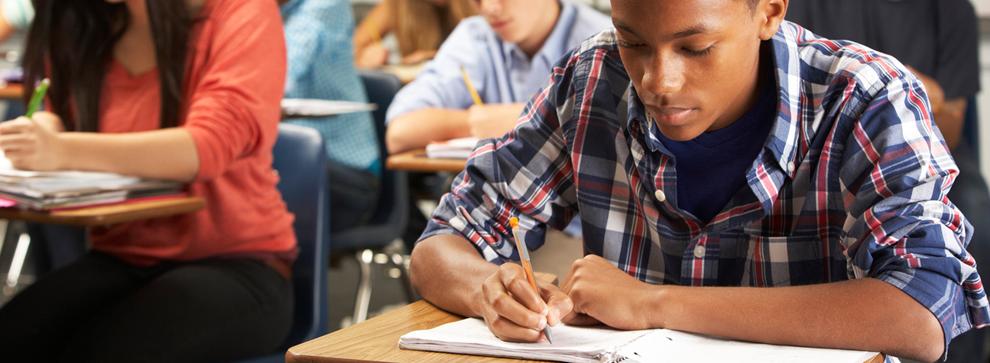
► "We are moving towards a harmonization of the rating"
Julie Bouvry, principal, deputy academic secretary of the SNPDEN union in Paris
To speak of one and the same tank is not exact. Because there is, alongside the general route, a technological route and a professional route, which is already largely based on continuous monitoring. In addition, the abolition of courses in favor of a common core supplemented by specialist teaching means that there are almost as many baccalaureates as there are students... Moreover, not so long ago, the subjects of the final exams were not national but academic, without speaking of the Bordeaux or Strasbourg baccalaureate!
→ MAINTENANCE. Baccalaureate: "The educational community is ripe to abolish common tests"
The abolition of the common tests to base 40% of the final mark on the quarterly reports of first and final does not fundamentally change the nature of the baccalaureate: the diploma will be based 60% on final tests - French, philosophy, the great oral and the two specialty courses.
Nevertheless, the rise of continuous monitoring should lead us to rethink our assessment practices, with training, support from the inspection bodies, harmonization commissions to smooth out the differences between establishments. Teachers must rely on the national bank of subjects which had been created for the common tests and which could become a bank of exercises. There will also continue to be common assignments or white bins.
So, yes, within the same high school and in the same subject, two teachers can mark differently. But it is likely that across all disciplines, these disparities balance each other out. It should also be borne in mind that each quarterly average in the subjects assessed in continuous assessment (history-geo, languages, scientific education and sport) will count for barely 1% of the overall mark for the baccalaureate.
It will also be necessary to fight the pressures that students and their parents could exert on teachers, pressures that already exist in high schools where many young people aim for selective training. Headteachers will have to play their full role. As it will be necessary to adopt a consistent and firm attitude in the event of absence during an assessment, some students may be tempted not to take a test in order to maintain a good average.
How to Clean Whiskey Stones -https://t.co/3TmQpGQffm
— Nasıl Abi Sat Nov 09 01:52:11 +0000 2019

In any case, with this layout of the baccalaureate, we are moving towards a harmonization of the notation. We are invited to ensure that a 15/20 means roughly the same thing regardless of the school. Above all, it will make it possible to articulate this diploma with Parcoursup. For a long time, the process of orientation towards the superior was based exclusively on continuous control. The baccalaureate, for its part, had above all a symbolic significance and made it possible to validate, for the vast majority, an assignment in higher education. With the new baccalaureate, Parcoursup takes into account two thirds of the baccalaureate marks.
► "We kill the confidence that we could still have in this diploma"
Marie Duru-Bellat, professor at Sciences Po Paris, sociologist of education.
We have gradually reduced the number of baccalaureate final exams, because they are too expensive and cumbersome to organize and correct. But we didn't really worry about the pedagogical consequences. By increasing the part of continuous control, we kill the confidence that we could still have in this diploma.
In fact, 40% of the baccalaureate will be granted locally, by the candidate's teachers. However, teachers take note of their audience, more or less consciously referring to a Gaussian curve: a handful of very weak pupils, a handful of very strong ones and, in the middle, many supposedly average pupils. And this, even if the class only has very good or very weak! Because the inspector would run immediately if the average was 18/20 or on the contrary barely 5/20...
Scoring, as we know, is affected by many biases. A student who has illiterate parents is not rated in the same way as the son of a colleague or the little brother of a former student who attended the École Normale Supérieure. One can also be tempted to use the note to take revenge for disruptive behavior…
In short, we will not know, with the new formula, what the baccalaureate really sanctions. At first glance, we can say that high schools with a lot of weak students will tend to overrate, which could disadvantage high school students enrolled in more popular schools. Except that the reputation of the school in which we will have prepared for the exam will count even more than today. In higher education, a form of wild correction will take place, with a bonus for files from high schools which we think are used to under-noting.
Moreover, it is also not a gift to be given to high school students to grant them baccalaureate marks that do not reflect their level. This increases the risk of failure when entering higher education.
It may seem corny but the standardized national tests seem to me the best way to assess everyone's achievements. That said, the real factor of inequality is not the method of assessment at the baccalaureate but the disparity of means between high schools, the differences in the profile of the teachers who teach there, the replacement or non-replacement of teachers. absent…
And it would also be misleading to affirm that we are abandoning an ideal system to fall into a totally perverse functioning: a good part of access to higher education, in the selective courses, will be based on the marks obtained in the specialty lessons, lessons which will be the subject of a final test, coefficient 16, anonymously.







